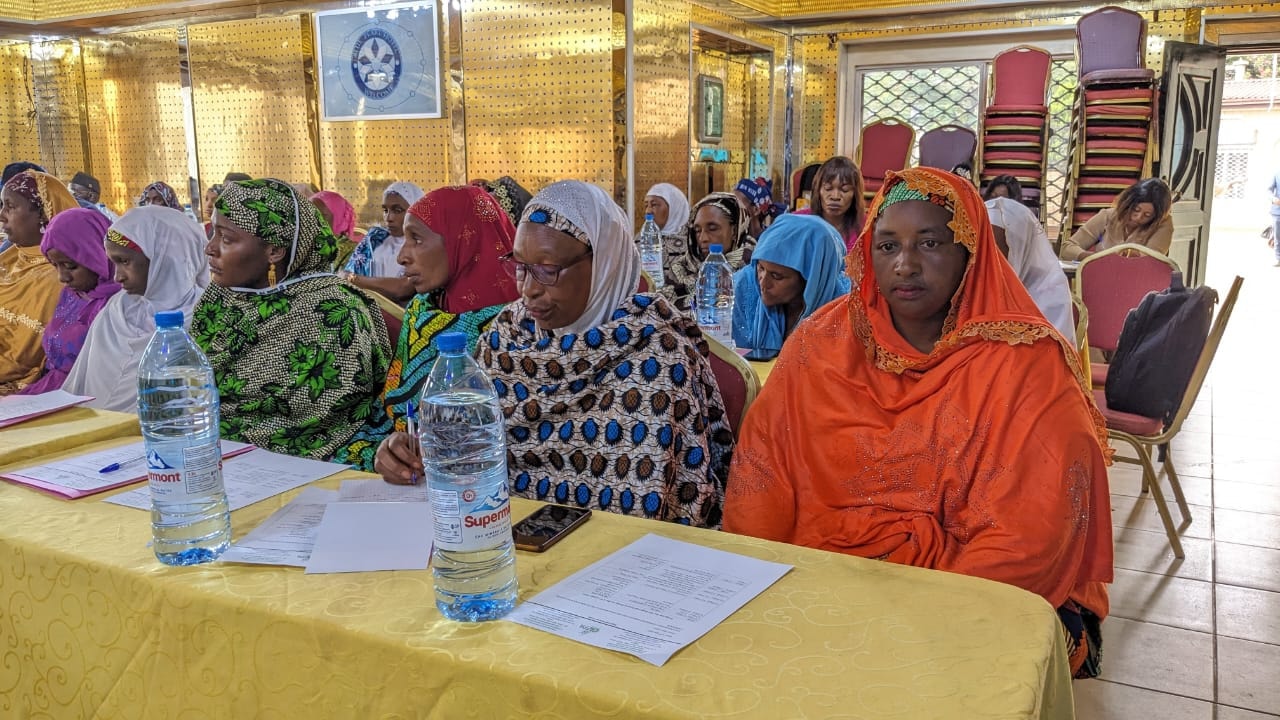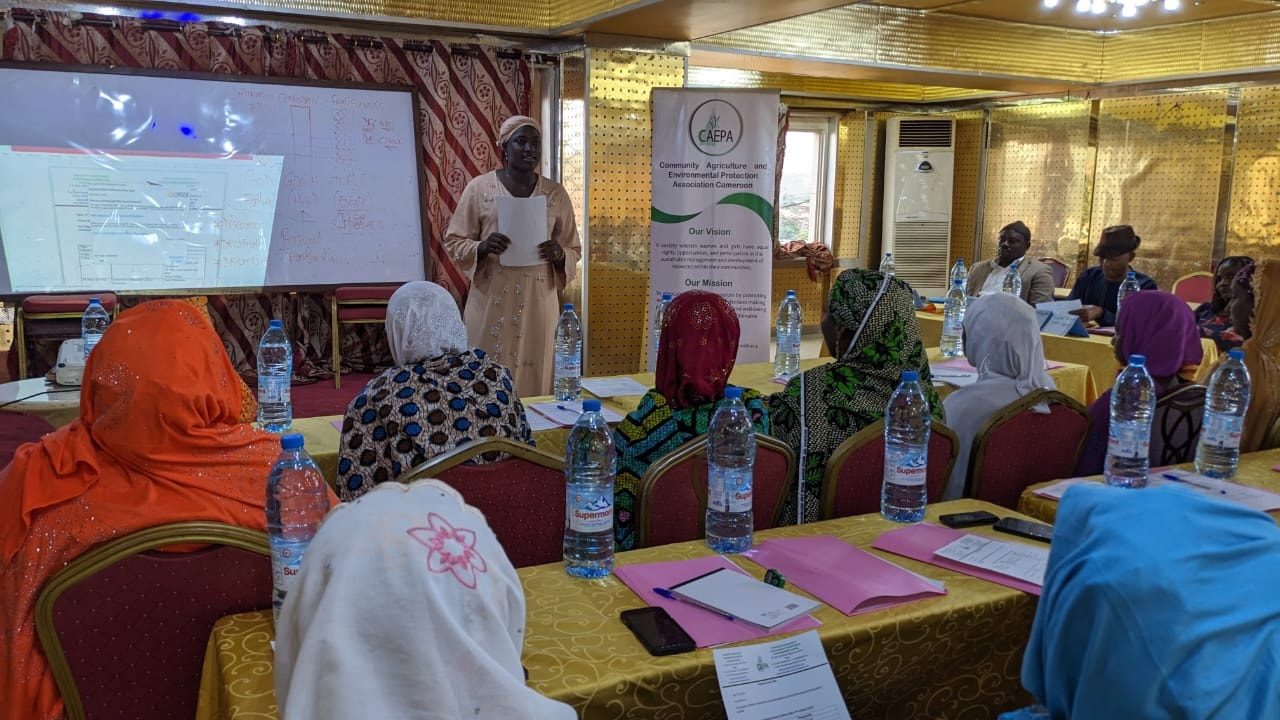CAEPA CONVENES REGIONAL DIALOGUE ON LAND RIGHTS FOR SOCIO-ECONOMIC DEVELOPMENT IN CAMEROON
🎯 Dialogue Theme
"Regional Dialogue on land rights for Mbororo women's socio-economic development in the North West Region"

CAEPA CAMEROON has organized a round table Regional Dialogue on land rights for Mbororo Women in the North West Region. The dialogue which is taking place in Bamenda, chief town of the NWR, is organized under the theme "Regional Dialogue on land rights for Mbororo women's socio-economic development in the North West Region. The event brings together Mbororo women advocates, government/community stakeholders alongside partner organizations to the dialogue table to address land related issues in the region as the Programs Coordinator explains "land is an important assert to all but we notice that women face some gender barriers which hinders their access and control to land. These women do not only face gender bias but have been discriminated upon by existing customary laws/norms which we shall address in the course of this consensus meeting together with other stakeholders" says Fenwi Linda. This event aimed at promoting equitable access to land for both men and women, comes as an add-on to CAEPA's women right interventions in Bamenda l, lll and Tubah Sub Divisions of the North West Region.
Land is an important assert to all but we notice that women face some gender barriers which hinders their access and control to land. These women do not only face gender bias but have been discriminated upon by existing customary laws/norms which we shall address in the course of this consensus meeting together with other stakeholders.
Beng Ivan, the Regional Delegate for State Property in the NWR, after listening to these women, admits that the land procurement procedures and monetary obligations pose severe challenges to Mbororo women's land acquisition in today's society. He however states that the 1974 Land Law defines parties liable to own land being both male and female. These women however table the systemic and cultural norms that pose as hindrances to their ability to have access and control over land, though being the primary users of land in the Agricultural domain. Speaking at the event in this light, these women bring three main issues to the dialogue table.
🚨 Key Issues Raised
- Stringent inheritance procedures on women
- Noncompliance to Will writing
- Financial constrains due to over dependency

These Mbororo women advocates who hail from Bamenda l, lll and Tubah Sub Divisions say that their husbands see Will Writing as witch-hunt that eventually leads to untimely death as Hawa Uh Sali explains "I want to talk about this issue of Will Writing. At a point in my life, I needed my husband to write his Will and keep. The moment I voiced it out, it brought problems to my marriage. Mbororo men feel that, when you talk of Will Writing, you are indirectly wishing them death. I have also seen families where the fathers refuse to write their Will but once they die, families remain in turmoil. We need our traditional leaders here present to help implement the concept of Will Writing".
I want to talk about this issue of Will Writing. At a point in my life, I needed my husband to write his Will and keep. The moment I voiced it out, it brought problems to my marriage. Mbororo men feel that, when you talk of Will Writing, you are indirectly wishing them death. I have also seen families where the fathers refuse to write their Will but once they die, families remain in turmoil. We need our traditional leaders here present to help implement the concept of Will Writing.
Maimouna Jibu Chipped in on the dialogue table to lay a complain on the inheritance procedures being practiced in today's society "Islamically, when it comes to inheritance in our culture, women inherit half of what a man inherits. But it becomes troubling when we women are not given our rightful share of inheritance. Usually when a father dies, the uncles in the family share the deceased property and women are often given nothing while the boys inherit lands and cattle. We need our religious leaders/traditional heads here present to ensure a fair process in property distribution".
Islamically, when it comes to inheritance in our culture, women inherit half of what a man inherits. But it becomes troubling when we women are not given our rightful share of inheritance. Usually when a father dies, the uncles in the family share the deceased property and women are often given nothing while the boys inherit lands and cattle. We need our religious leaders/traditional heads here present to ensure a fair process in property distribution.
Making her own debut on the existing barriers to land access, ownership and control Karawa Usman talks on the cumbersome procedure of acquiring a land title "I am a widow. Thanks to the coming of CAEPA in partnership with AWDF, I have been educated and I have seen the need to secure my land. I went to up station and a lawyer informed me of a lengthy and confusing process which will require that I pay all the actors involved huge sums, before I get the land title. I am very discouraged and I do not have the money for such venture. Please, the government has to look into this issue. The process is cumbersome".
I am a widow. Thanks to the coming of CAEPA in partnership with AWDF, I have been educated and I have seen the need to secure my land. I went to up station and a lawyer informed me of a lengthy and confusing process which will require that I pay all the actors involved huge sums, before I get the land title. I am very discouraged and I do not have the money for such venture. Please, the government has to look into this issue. The process is cumbersome.
As the meeting ensured, these points were discussed leading to increase awareness rising among stake holders present. The Chief's delegation from Banja represented by Ardo Mamada himself and the quarter head, praised these women's willingness to speak out for community development. He equally implored them to seek the advice of the Ardo as well as the Muslim scholars of moral standing at the advent of death and property distribution.
To add, Barrister Unusa Karimou, one of the facilitators educated these women on Understanding the Land Laws in Cameroon to give a broader perspective to their already acquired knowledge. Reacting to the concerns raised on the dialogue table, to strive to learn the right Islam from verified scholars lest they be misled and taken advantage of, Barrister Unusa goes ahead to remark that these women need their livelihood to be assured, and this can only happen through their access to land "let the government, stakeholders and traditional rulers rally and ensure that these women have access to land. These women have the right to know the law and abide by it. The law does not discriminate between genders. I foresee the need to equally empower men". Through this deliberation that lasted for over 3 hours, the consultative meeting has successfully strengthened collaboration and partnership between community leaders and Mbororo women. It has laid the foundation for them to participate on decision making tables and this is how they feel,
⚖️ Legal Education Focus
Barrister Unusa Karimou emphasized that the law does not discriminate between genders and stressed the importance of empowering both men and women with knowledge of Cameroon's land laws.
Regional Delegate for State Property
Chiefs and Ardo representation
Mbororo women from multiple divisions
Barristers and law facilitators
The level at which we are now is very high. I could never have expected a Mbororo women to have all these knowledge and opportunities. We can also own land and it is amazing. We are so happy to have been part of this project and gained this knowledge on land usage and security.
Without CAEPA, we will never know all these. I am so happy being here and I am hoping to be among the team going to Yaoundé to express my plight as a Mbororo women at the National Dialogue. I tell you, the advocacy continues and measures will eventually be implemented. If not now, I believe for our daughters.
I am rest assured that the knowledge we have gained will not only cause any harm. However, there is need for CAEPA to enlighten our husbands because from my observation, ignorance is acting as a very influential factor to all the challenges we are facing.
✅ Dialogue Outcomes
Discussions today have greatly strengthened these women. They have been further spurred to own land, be in possession of their marriage certificates and equally create CIG's to benefit from existing knowledge and advantages open to the community. All these come to empower these women towards socio-economic benefits in society and strengthen them as land advocates for their communities. It is hoped that these women shall again sit on the dialogue table to raise national awareness on Mbororo Women's land rights in Cameroon.
